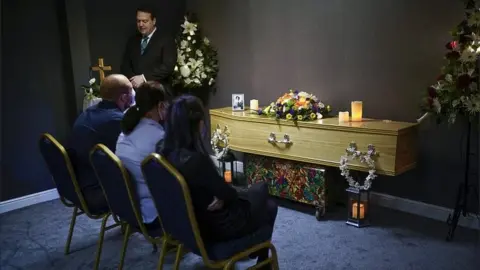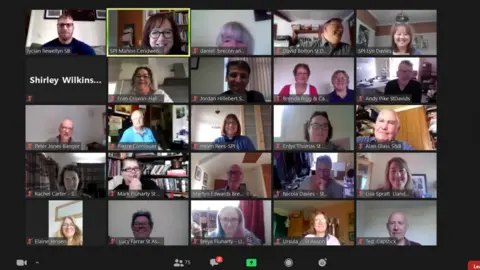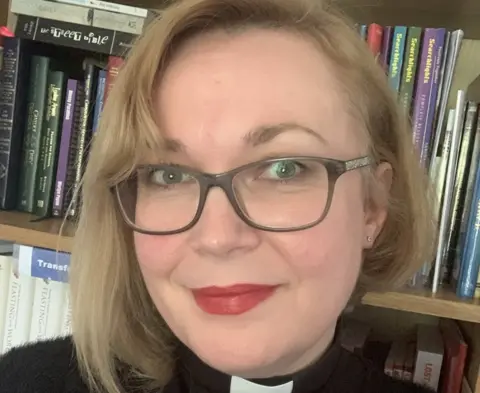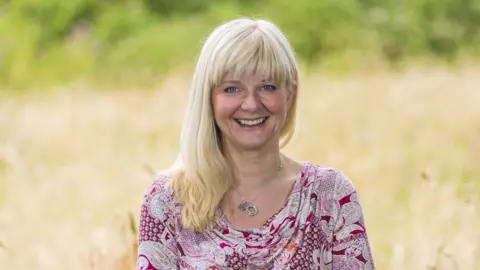Covid is making us talk about death, says funeral planner
 Getty Images
Getty ImagesAs a humanist celebrant, Julia Page has seen first-hand how the coronavirus pandemic has affected those who have lost loved ones.
Not being able to say goodbye at the hospital, restrictions on funerals, and social distancing ruling out hugs or simply holding hands has made bereavement "more challenging".
But Covid-19 has also changed the way we talk about death, Julia says.
"People are being more frank and honest".
"Covid has made many people think and feel that death could be closer than we think.
"I think this is a good thing to have come out of this pandemic. Death is inevitable for us all; it makes sense for us to come to terms with this.
"People have become more comfortable about talking about their own demise."
Breaking taboos
Julia's funeral planning website focuses not on the costs but on what people would want at their own funeral - things like flowers, music, readings and photographs.
Talking openly and "feeling able to explore our attitudes and fears" is beneficial to people's mental health, says Julia, who is based in Llantwit Major in the Vale of Glamorgan.
"As a Samaritan and a qualified counsellor, I am very much aware of the power of letting people talk about subjects which might previously have been thought of as being taboo," she said.
"Considering the possibility, rather than shying away from it, facing up to our own mortality and planning for death in a sensible and tangible way might help us as a population deal with it, as well as help those we leave behind.
"It is a kindness to our loved ones to make our wishes clear and take away the pressure of making decisions from them at a time when they are least able to deal with it."
Modern communication
The Church in Wales is also having to adapt to the new realities of life in the time of coronavirus.
 Reverend Manon Ceridwen James
Reverend Manon Ceridwen JamesRevd Manon Ceridwen James, who served in a number of parishes across north Wales before becoming director of ministry for the Diocese of St Asaph and dean at St Padarn's Institute, Cardiff - the church's training arm - said ministers were "having to learn new skills of doing pastoral work by text, WhatsApp, video call or phone".
"Given that numbers at funerals are limited, it is difficult for them to attend funerals as they are taking up a precious space," she said.
"The real difference I've seen is that it's not as easy to do face-to-face work and so comforting the bereaved is very hard when you are not physically there.
"So learning to be comfortable with silence on the phone or a video call is important and allowing people to talk and listening to them."
 Revd Charlotte Rushton
Revd Charlotte Rushton
Revd Charlotte Rushton, of the Parish of Merthyr Tydfil, St David and Abercanaid, said: "Our end-of-life ministry has seen a shift in attitude.
"In my experience, our Christian community has always been at ease with discussing the end of their life, as we have a sure and certain hope of eternal life in God. That being said, the wider community has cherished a Christian burial like never before.
"A large portion of people viewed a Christian funeral as 'proper'. However this year, bereaved families are showing their vulnerability as never before.
"Many have genuinely examined their 'faith', the Christian message and who Jesus truly is. It has become clear that more people are finding true comfort in our Gospel message."
'Closer to all our doors'
With constant reporting of Covid-19 cases around the world, it is very difficult to avoid hearing about death at least once a day, said Julia Page.
"We need to be aware that this isn't something which just affects adults too.
"Young people will have also been exposed to the news, as well as increased fear about the health and safety of their grandparents.
"So it is important that we allow them to engage in conversations to help them process what they are hearing in a realistic but healthy way."
Julia added that the pandemic had brought death "closer to all our doors".
"It has opened our eyes and minds to what death is, what is means to us and to our loved ones," she said.
"Talking about dying isn't an invitation for it to happen - it is a way of dealing with it, making your peace with it and moving on to live your life."

